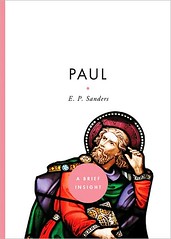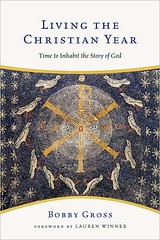the (re)public house | Brewed according to the Rheinheitsgebot Purity Law of 1516.
I just started reading Jack Miles' Christ: A Crisis in the Life of God. I haven't gotten very far, but I am very much enjoying this wonderfully written and thought provoking book. Anyway, there's a section in the prologue that I thought I'd throw out for the faithful DiP readers to chew on for a while.
'The great Western myth is designed to raise a second, more profound and more disturbing question, however: If God had to suffer and die, then God had to inflict suffering and death upon himself. But why would God do this?
Tout comprendre, c'est tout pardonner, the French say: To understand everything is to forgive everything. Every perpetrator was first a victim. Behind every crime stretches a millennial history of earlier crimes, each in its way an extenuating circumstance. But to whom does this infinite regression lead in the end if not to God? The guilt of God is certainly not a Christian dogma, and yet it is an emotionally inescapable implication of the Christian myth, visible and audible in countless works of Christian art. The pathos of those artistic enactments - those masses and oratorios, passion plays and memorial liturgies, and above all those paintings and sculptures in which the unspeakable is left unspoken - is inseparable from the premise that God is inflicting this pain upon himselft for a reason. "The real reason," as Albert Camus wrote in his haunting novel The Fall, "is that he himself knew he was not altogether innocent."'
(Here's the bio on Miles, for those who aren't familiar: He is a writer whose work has appeared in numerous national publications, including The Atlantic Monthly, The New York Times, The Boston Globe, The Washington Post, and The Los Angeles Times, where he served for ten years as literary editor and as member of the newspaper's editorial board. The recipient of a Ph.D. in Near Eastern Languages from Harvard University and a former Jesuit, he has been a Regents Lecturer at the University of California, director of the Humanitities Center at Claremont Graduate University, and visting professor of humanities at California Institute of Technology. His first book, God: A Biography, won a Pulitzer Prize and has been translated into fifteen languages. He is currently the senior advisor to the president of the J. Paul Getty Trust, a foundation supporting art and scholarship. Also, Camus is my favoite writer of all time - if you don't know him, then you have serious reading to do.)
'The great Western myth is designed to raise a second, more profound and more disturbing question, however: If God had to suffer and die, then God had to inflict suffering and death upon himself. But why would God do this?
Tout comprendre, c'est tout pardonner, the French say: To understand everything is to forgive everything. Every perpetrator was first a victim. Behind every crime stretches a millennial history of earlier crimes, each in its way an extenuating circumstance. But to whom does this infinite regression lead in the end if not to God? The guilt of God is certainly not a Christian dogma, and yet it is an emotionally inescapable implication of the Christian myth, visible and audible in countless works of Christian art. The pathos of those artistic enactments - those masses and oratorios, passion plays and memorial liturgies, and above all those paintings and sculptures in which the unspeakable is left unspoken - is inseparable from the premise that God is inflicting this pain upon himselft for a reason. "The real reason," as Albert Camus wrote in his haunting novel The Fall, "is that he himself knew he was not altogether innocent."'
(Here's the bio on Miles, for those who aren't familiar: He is a writer whose work has appeared in numerous national publications, including The Atlantic Monthly, The New York Times, The Boston Globe, The Washington Post, and The Los Angeles Times, where he served for ten years as literary editor and as member of the newspaper's editorial board. The recipient of a Ph.D. in Near Eastern Languages from Harvard University and a former Jesuit, he has been a Regents Lecturer at the University of California, director of the Humanitities Center at Claremont Graduate University, and visting professor of humanities at California Institute of Technology. His first book, God: A Biography, won a Pulitzer Prize and has been translated into fifteen languages. He is currently the senior advisor to the president of the J. Paul Getty Trust, a foundation supporting art and scholarship. Also, Camus is my favoite writer of all time - if you don't know him, then you have serious reading to do.)

twitter.
comments.
matthew.
photo.
local favorites.
friends.
- Bizzaro World (Liz)
- blake burris (Blake)
- candidly katie (Katie)
- dandeelines (Dan & Diedra)
- drank the water (Veronica)
- dropping swords (John B.)
- e blinks (Erynn)
- glades of light (Patrick)
- grace & peace (Dan)
- grand larseny (Daniel)
- hanging with the hammacks (Adam & Sara)
- heytyson (Tyson)
- hi i am matt (Matt)
- Idaho Heart (Mike)
- It's Chinese to Me (John R.)
- Jay's Blog (Jay)
- John McGee Live (John McG.)
- Let All The Earth... (Trey)
- Love on the Internet (Creth)
- Ms Rory in the Heart of Texas (The Badrina Family)
- Mission and the Church (Will)
- Mudd between my toes (Ryan)
- Performing the Faith (Ben)
- Press the Star Key (Jerod)
- Prof's Soapbox (Dr. Wallace)
- Some Kind of Ride (Kimberly)
- SonnyD.com (Sonny D)
- stumbling through the the post-blog world (Ben)
- The Boudreaus (Stephen & Shelley)
- The Crum Family (Will & Jenny)
- The Dodd Blog (Kate & Ryan)
- The Mathews Family (Mark)
- The Iles (Angie)
- The Myers (Josh & Amanda)
- Theological Ruminator (John Mark)
- The SMFL Blog (Commish)
- The Williams Family (Travis & Amy)
- The Youngs (Mary)
- Trading Tacos (Nick)
- us (Jonny5)
- watermark west (Michael)
site nav.
old conversations.
- 09.2004
- 12.2004
- 03.2005
- 04.2005
- 05.2005
- 08.2005
- 11.2005
- 05.2006
- 07.2006
- 08.2006
- 09.2006
- 10.2006
- 11.2006
- 12.2006
- 01.2007
- 02.2007
- 03.2007
- 04.2007
- 05.2007
- 06.2007
- 07.2007
- 08.2007
- 09.2007
- 10.2007
- 11.2007
- 12.2007
- 01.2008
- 02.2008
- 03.2008
- 04.2008
- 05.2008
- 06.2008
- 07.2008
- 08.2008
- 09.2008
- 10.2008
- 11.2008
- 12.2008
- 01.2009
- 02.2009
- 03.2009
- 04.2009
- 05.2009
- 06.2009
- 07.2009
- 08.2009
- 09.2009
- 10.2009
- 11.2009
- 12.2009
- 01.2010
- 06.2010









